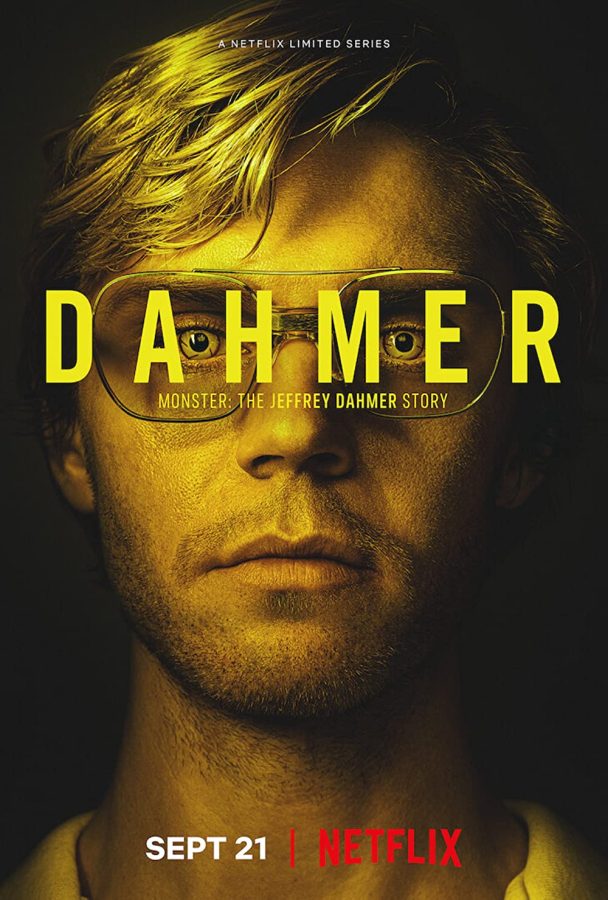The fault of true crime docuseries
Photo courtesy of Netflix
Dahmer- Monster: The Jeffrey Dahmer Story series poster
Anthony Sears. Ernest Miller. Matt Turner. Do you recognize those names? They are just 3 of 17 men whose lives were cut short and whose legacies were permanently stained by the actions of another. Though these men were the victims, the ones who should be remembered, their killer’s name remains the one up in lights.
On Sept. 21, Netflix reopened the wound that is the Jeffrey Dahmer case with the release of Dahmer – Monster: The Jeffrey Dahmer Story. This reenactment series starring American Horror Story’s Evan Peters as Dahmer added to nearly a dozen documentaries and shows covering the tragic cannibalistic slayings of the late 20th century.
The show quickly became the streaming platform’s second-most-watched series of all time, racking up over 700 million hours of viewership within the first 3 weeks of release according to variety.com. The show’s instant popularity served as a testament to an increasingly well-known fact: true crime sells.
Society has adopted a growing fascination with what criminologist Scott A. Bonn labeled as “celebrity monsters” in a 2017 article for Psychology Today. In this piece, Bonn wrote, “The crime news coverage of so-called monsters is typically stylized and exaggerated in order to entice a wide public audience,” thus encouraging the entertainment industry to sensationalize such cases.
While it is true that dramatized reenactments and documentaries are profitable, they are thoroughly exploitative of the victims of the heinous crimes depicted. With each new cinematic addition to the pile, the pain experienced by loved ones at the time of the crime is dredged up, and for what?
This is where Monster: The Jeffrey Dahmer Story was supposed to stand apart from the crowd. According to washingtonpost.com, Producer Ryan Murphy emphasized shedding light on the lives of the victims as the show’s primary intention. However, within the first few episodes, it becomes clear that this goal failed to be met.
Instead of highlighting his victims’ stories, the series is a biopic of Dahmer through and through, spending the majority of most episodes recounting his life events in nauseating detail.
The show’s redeeming achievement of portraying the prejudicial inaction of the Milwaukee Police is minimized by the spotlight being placed on Dahmer. This ill-placed focus has had some ruinous repercussions: serial killer fanatics. Floods of social media posts have surfaced since the release of the series romanticizing and even expressing pity for the serial killer.
One TikTok user said, “Evan [Peters] playing Jeff makes it hard for me not to feel bad for him.” The entertainment industry has a recent history of starring young, conventionally attractive actors as murderers such as Ross Lynch who played Dahmer in My Friend Dahmer (2017) and Zac Efron who portrayed serial killer Ted Bundy in Extremely Wicked, Shockingly Evil and Vile (2019).
On top of this, the show explicitly depicts Dahmer’s upbringing in a neglectful home riddled with mental illness. In particular, Dahmer finding his mother after a suicide attempt and her subsequent abandonment felt as if the writers were trying to garner sympathy for him. These choices further divert attention away from the victims, begging the question of if they were truly in mind when the script was crafted.
In a conversation with Insider, Rita Isbell, the sister of Errol Lindsey, one of Dahmer’s victims, disclosed that she was never approached about the creation of the show. “It’s sad that they’re just making money off of this tragedy,” she said. “That’s just greed.” Eric Perry, a cousin of Lindsey, tweeted that the series is “retraumatizing” his family.
There is no reason why a serial killer should be a pop-culture icon while the voices of those most impacted by the events are stifled.
There’s an easy solution to this: Stop churning out new media about these crimes. Society does not need more “awareness” about murderers.
The people concerned are not just characters in a show or pieces of history, they were children, siblings and friends whose lives were gruesomely and tragically ended. The least we can do is listen to the families of victims and share their lives, making them more than a mere mention in a show.

